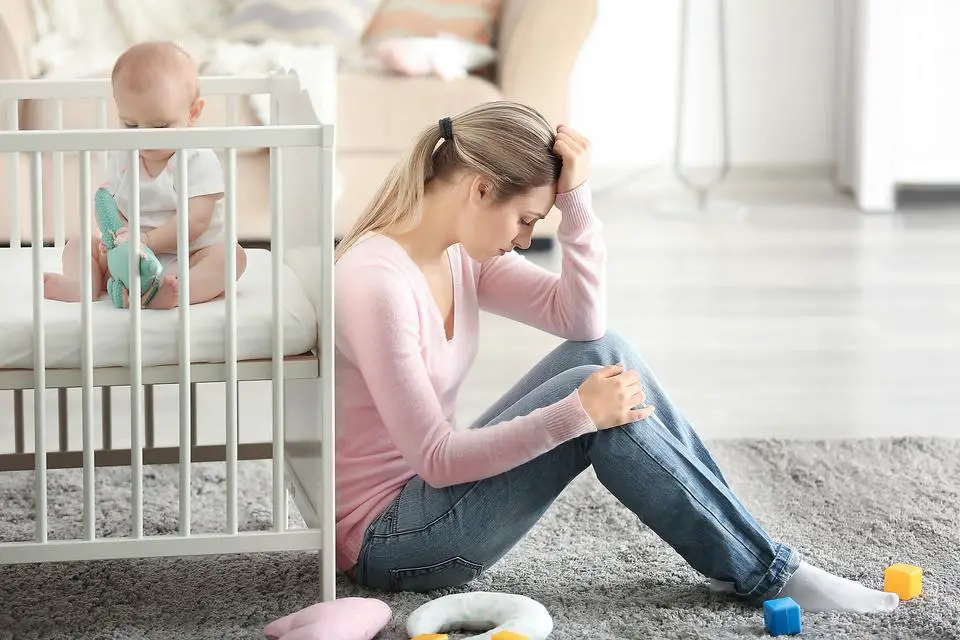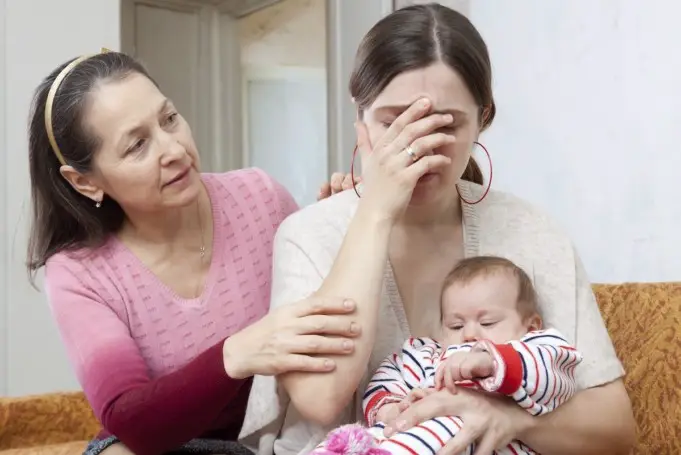Giving birth to a baby can be fun, exciting and overwhelming all at the same time. The excitement that the newborn baby brings can flood the heart of the new mother or father, however, things can quickly go south for some new parents.
As shocking as it is, the rush of this powerful emotions can cause depression for the new mother. Are you surprised yet?
Almost immediately after the woman undergoes the entire process of childbirth, some women tend to have a disorder known as “postpartum disorders”. Postpartum disorders otherwise known as baby blues are the typical reactions a woman experiences just after the birth of her baby.
These reactions may include mood swings, crying, intense difficulty in sleeping and anxiety disorders. There are so many causes and factors that could result in postpartum disorders and a tweak in their mental health.
Typically, the onset if baby blues usually begins within the first few days of delivery (mostly after the 2nd or 3rd day), and it can last up to a month or two after birth. It is usually expected to subside when the hormonal levels begin to return back to normal in the woman’s body.
However, for some new moms, theirs might acquire a long lasting effect known as postpartum depression. Postpartum depression can be unusually very severe in some women. Most times, this condition is usually misinterpreted.
Postpartum depression is not a character defect or a weakness, and it is typically a complication of the birth process. It could sometimes happen if the woman had a really long and stressful delivery.
Postpartum depression gives off all the normal signs of depression. The only difference is that it begins only after birth. Postpartum depression can start anytime after birth (although it doesn’t exceed the first 4-6 months) and it can even last up to a year.
Research has shown that about 10-20% of new moms usually experience postpartum depression.
At first, it is possible to misdiagnose postpartum depression as baby blues because at the initial stage, they both give off the same kind of symptoms but the difference between the both of them is that postpartum depression lasts a lot long longer and is more severe than baby blues.
There are signs to be noticed when a woman is experiencing baby blues and these symptoms include: intense mood swings, anxiety, sadness, irritability, the feeling of always being overwhelmed, crying, reduced concentration and focus, eating disorders such as binge eating and bulimia, lack of appetite in some women, intense trouble sleeping, some even may end up having night scares and so on.
Those are the signs that will be seen for baby blues, however, they don’t last long but for postpartum depression, the signs expected to be recognized are sullen mood and the feeling of always being depressed, severe mood swings, intense crying, difficulty or the inability to bond with your baby, withdrawal from both friends and family, loss of appetite or eating excessively much more than before, eating disorders such as binge eating and bulimia.
Other symptoms include difficulty in sleeping, inability to sleep,always feeling excessively tired and intense fatigue, sudden lack of interest in the things that generally give you joy and pleasure, severe anger issues, emotional irritability, fear of never being a good mother, the feeling of hopelessness, always experiencing the sense of worthlessness, shame, inadequacy, and guilt, reduced ability in concentrating and focusing on a particular task, inability to make appropriate decisions, restlessness, severe anxiety disorders, intense panic attacks, always having so many thoughts on how to harm yourself or your baby or both, and intense recurring thoughts of suicide and death.
These are the symptoms one who has postpartum depression would likely experience, and if it is left untreated and unattended to, it can go on for many months and can span into something more substantial such as postpartum psychosis.
Guess what; new fathers as well can also experience postpartum depression as well. The feeling of having to take care of a newborn as well as providing for the baby can trigger the feeling of sadness, tiredness, and the sense of always being overwhelmed.
They may also likely experience unusual changes in their sleeping patterns or generally the same symptoms a new mother would experience when going through this phase.
Most young fathers who already have a history of depression, experiencing relationship or family problems, or are already struggling financially before the baby was born tends to be more at risk of having postpartum depression than other fathers.
Postpartum depression in fathers otherwise known as paternal Postpartum depression can have the same adverse effect on partner, bonding relationships as well as child development just as postpartum depression in mothers would have as well.

There are some factors that can contribute to mothers or fathers having postpartum disorders, and they include:
1. Hormonal fluctuations and changes
After a woman gives birth to her newborn, there will be high hormonal fluctuations in her body hence causing her to have a hormonal imbalance.
Intense hormonal level fluctuations can cause instability in the levels of hormones such as serotonin which is also part of the happy hormone family.
A decrease in this hormone or any other happy hormones which are endorphins and dopamine will cause the development of postpartum depression.
2. Situational risks
One of the significant experiences that changes a woman’s life forever is Childbirth. In fact, it is considered a major life transition and change.
If another significant event such as death coincides with childbirth, it can cause a series of emotional fluctuations and can lead to postpartum depression.
3. Life stress
When there is an ongoing stressful circumstance, it can compound the pressure of having of having a newborn and can also trigger the development of postpartum depression.
For example, when a new mother who is also an office employee is overly stressed, she can be seen to have emotional imbalances causing her to be at risk of developing postpartum depression.
Postpartum psychosis
Postpartum psychosis is a sporadic condition. This occurs when the mother begins to lose her touch with reality shortly after childbirth.
The woman starts to see things which aren’t there, and she begins to hear sounds and voices and eventually if not helped on time, she would start to believe them.
The symptoms of postpartum psychosis are unique and similar to those who have bipolar or manic episodes. Mostly, these episodes begin with the inability to sleep, feeling of restlessness and/or irritability.
If these symptoms are left untreated, they can lead to other symptoms such as
- Auditory hallucination: The woman would begin to hear things that aren’t real. Such voices might even start to suggest that she kills herself or the baby.
- Delusional beliefs which are usually as regards the baby such that others are trying to harm or possibly kill her newborn
- Lack of orientation as regards her timezone or where she is
- Unusual and erratic behaviour
- Rapidly changing moods: The woman might be feeling an intense bout of sadness one minute, the next minute she is up, and jumping about in excitement
- Suicidal thoughts to the baby or to her.
- Violent thoughts that are usually targeted to the mother harming herself or her baby.
Risk factors that can cause postpartum psychosis include
- History of having bipolar disorders
- History of ever having postpartum psychosis after a previous pregnancy
- History of schizophrenia
- If the woman comes from a family who had bipolar disorders or schizophrenia
- If this is the woman’s first pregnancy
- If the woman discontinued her psychiatric medications after pregnancy.
If a woman has postpartum psychosis or she falls under any of these risk factors, she must see a doctor immediately.












